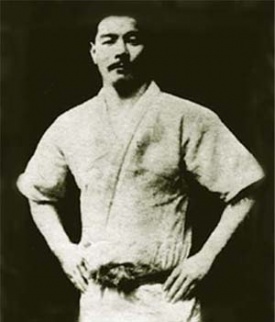Conde Koma: Difference between revisions
No edit summary |
|||
| Line 29: | Line 29: | ||
After several months of public wrangling, Taka and Maeda met at the Colon Theater on November 16, 1909; Taka won. There was an immediate rematch, and four days later, Maeda was pronounced the champion. It was later revealed that Taka was, in fact, Maeda's old friend, Soishiro Satake. | After several months of public wrangling, Taka and Maeda met at the Colon Theater on November 16, 1909; Taka won. There was an immediate rematch, and four days later, Maeda was pronounced the champion. It was later revealed that Taka was, in fact, Maeda's old friend, Soishiro Satake. | ||
In January 1910, Maeda took part in a wrestling tournament in Mexico City. During the semifinals, Maeda drew with Hjalmar Lundin. This is a different result than Lundin recalled in his 1937 memoirs. Said Lundin, "Having been accustomed to handling the big Greco-Roman wrestlers with ease, the Jap thought he could do likewise with me, but in the first encounter I got the better of him, after which my confidence returned. I had no trouble then in winning the match. It was a surprise to the crowd and a set-back for Koma. He had been the hero all week, but as soon as he was beaten the fans, true to form, called him a bum." | |||
In July 1910, Maeda returned to Cuba, where he tried to arrange matches with Frank Gotch and Jack Johnson. The Americans ignored him-there was no money to be made wrestling him, and much money to be lost if they lost to him.[5] On August 23, 1910, Maeda wrestled Jack Connell in Havana; the result was a draw.During 1911, Maeda and Satake were joined in Cuba by Akitaro Ono and Tokugoro Ito. | |||
Revision as of 19:08, 17 August 2015
Profile
Mitsuyo Maeda (前田 光世 Maeda Mitsuyo, born November 18, 1878 in Funazawa village, Hirosaki, Aomori, Japan - November 28, 1941), a Brazilian naturalized as Otávio Maeda (Portuguese pronunciation: [oˈtavju mɐˈedɐ]), was a Japanese judōka (judo expert) and prizefighter in no holds barred competitions. He was also known as Count Combat or Conde Koma in Spanish and Portuguese, a nickname he picked up in Spain in 1908. Along with Antônio Soshihiro Satake (another naturalized Brazilian), he pioneered judo in Brazil, the United Kingdom, and other countries.
Maeda was fundamental to the development of Brazilian Jiu-Jitsu, including through his teaching of Carlos Gracie and others of the Gracie family. He was also a promoter of Japanese emigration to Brazil. Maeda won more than 2,000 professional fights in his career. His accomplishments led to him being called the "toughest man who ever lived" and being referred to as the father of Brazilian Jiu-jitsu.
During November 1908, Maeda went to Paris, France, apparently to see his friend Akitaro Ono. From Paris, he went to Havana, arriving there on December 14, 1908, and his twice-a-day wrestling act quickly proved to be very popular. On July 23, 1909, Maeda left Havana for Mexico City. His debut in Mexico City took place at the Virginia Fabregas Theater on July 14, 1909. This show was a private demonstration for some military cadets. Shortly afterwards, Maeda began appearing at the Principal Theater. His standing offer was 100 pesos (US $50) to anyone he could not throw, and 500 pesos (US $250) to anyone who could throw him. The Mexican Herald did not record anyone taking his money.
During September 1909, a Japanese calling himself 'Nobu Taka' arrived in Mexico City for the purpose of challenging Conde Koma for what the Mexican Herald said would be the world jujutsu championship. The match was a splendid business for the promoters.
After several months of public wrangling, Taka and Maeda met at the Colon Theater on November 16, 1909; Taka won. There was an immediate rematch, and four days later, Maeda was pronounced the champion. It was later revealed that Taka was, in fact, Maeda's old friend, Soishiro Satake.
In January 1910, Maeda took part in a wrestling tournament in Mexico City. During the semifinals, Maeda drew with Hjalmar Lundin. This is a different result than Lundin recalled in his 1937 memoirs. Said Lundin, "Having been accustomed to handling the big Greco-Roman wrestlers with ease, the Jap thought he could do likewise with me, but in the first encounter I got the better of him, after which my confidence returned. I had no trouble then in winning the match. It was a surprise to the crowd and a set-back for Koma. He had been the hero all week, but as soon as he was beaten the fans, true to form, called him a bum."
In July 1910, Maeda returned to Cuba, where he tried to arrange matches with Frank Gotch and Jack Johnson. The Americans ignored him-there was no money to be made wrestling him, and much money to be lost if they lost to him.[5] On August 23, 1910, Maeda wrestled Jack Connell in Havana; the result was a draw.During 1911, Maeda and Satake were joined in Cuba by Akitaro Ono and Tokugoro Ito.
